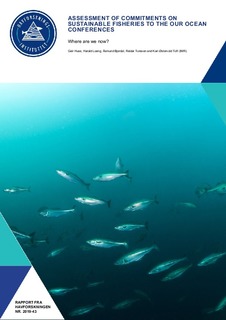| dc.contributor.author | Huse, Geir | |
| dc.contributor.author | Loeng, Harald | |
| dc.contributor.author | Bjordal, Åsmund | |
| dc.contributor.author | Toresen, Reidar | |
| dc.contributor.author | Toft, Kari Østervold | |
| dc.date.accessioned | 2020-02-10T12:03:22Z | |
| dc.date.available | 2020-02-10T12:03:22Z | |
| dc.date.created | 2019-10-29T13:41:03Z | |
| dc.date.issued | 2019 | |
| dc.identifier.uri | http://hdl.handle.net/11250/2640688 | |
| dc.description.abstract | Many ocean commitments have been made at the five Our Ocean conferences since 2014 under six different areas of action. The Institute of Marine Research was given the task of evaluating the 182 commitments made to the action area “Sustainable fisheries”. We analysed the content, summarised the progress of implementation and evaluated the impact of the commitments.
A total of 77 entities provided commitments. Governments made up the largest group and accounted for 65% of the commitments. NGOs were the second largest group of pledgers and accounted for 20% of the commitments.
There was a high degree of fulfilment of the commitments: three quarters of the commitments had a 50% or higher degree of fulfilment and 50% of the commitments have been finalised. Some recent commitments (made in 2017 and 2018) have not been initiated.
Combatting of illegal, unreported and unregulated fisheries and support to the port state measures process are key issues addressed by many of the commitments. We also recognise that important components such as science, advice and laws have less support in the Our Ocean commitments and should receive more attention in the future.
Regional fisheries management organizations (RFMOs) are important instruments for sustainable fisheries management and was addressed by some commitments. For RFMOs to be effective, we emphasize that they should be empowered to have legal authority to devise fisheries regulations.
There are quite a few commitments in our analysis that were hard to evaluate. To increase transparency in pledging of commitments, more emphasis should be put on documenting and evaluating their impact.
We consider that the Our Ocean commitments in sustainable fisheries overall have been successful in terms of generating attention to the issue and providing funding of projects that are supportive of sustainable fisheries. To achieve effective fisheries management and sustainable fisheries, it is important that all the components of the fisheries management system are in operation at the appropriate spatial scale (local, national, regional) over time. A gap analysis on requirements for achieving sustainable fisheries at the appropriate scale, is a good starting point for a systematic approach to providing commitments. We suggest that this is considered in future Our Ocean conferences. | nb_NO |
| dc.language.iso | eng | nb_NO |
| dc.publisher | Havforskningsinstituttet | nb_NO |
| dc.relation.ispartof | Rapport fra havforskningen | |
| dc.relation.ispartofseries | Rapport fra havforskningen;2019 - 43 | |
| dc.relation.uri | https://www.hi.no/templates/reporteditor/report-pdf?id=27977&90822079 | |
| dc.title | Assessment of commitments on sustainable fisheries to the Our Ocean conferences : Where are we now? | nb_NO |
| dc.type | Research report | nb_NO |
| dc.description.version | publishedVersion | nb_NO |
| dc.source.pagenumber | 37 | nb_NO |
| dc.source.issue | 2019-43 | nb_NO |
| dc.identifier.cristin | 1741699 | |
| cristin.unitcode | 7431,29,0,0 | |
| cristin.unitcode | 7431,1,0,0 | |
| cristin.unitcode | 7431,8,0,0 | |
| cristin.unitcode | 7431,2,0,0 | |
| cristin.unitname | Økosystem og ressurser | |
| cristin.unitname | Ledelse | |
| cristin.unitname | Fiskerifaglig senter | |
| cristin.unitname | Samfunn og kommunikasjon | |
| cristin.ispublished | true | |
| cristin.fulltext | original | |
